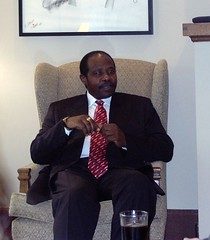If you were keeping track of such things, you'd know that we've been here in Ann Arbor for more than a month now. And if you were the sort to dwell on such things, you might note that this means the fellowship is 1/8th over. Try not to freak out about it. Time is flying, especially this past week, part of which I spent back "home" in St. Louis. I put "home" in fancy quotation marks because after a few days there, sleeping at a friend's house and driving around feeling a bit like a nomad, I'm driven to wonder what defines home. I own a house in St. Louis, but someone's renting it right now. I have friends in St. Louis but I have friends lots of other places.
But that's far too philosophical a musing for someone coping with the massive pain left behind from having a molar yanked from my head on Monday. If you have never experienced the very odd sensation of having one of your teeth wrenched away from your jaw bone, if you've never heard the crunching noise as it comes apart under the weight of your dentist's pliers, then you are a lucky soul.
Then again, as I have had so many opportunities to recall lately, I am a lucky soul as well. It was truly wonderful to see so many friends over a whirlwind weekend in the Lou, especially all my ladies. Here is what I know: it's good to be known. It's good to be somewhere where people know you. That I miss, sometimes.
 I arrived back home late Monday night after a really trying Southwest airlines flight and although I was tempted to stay in bed all day Tuesday and pity my bloody-gummed self, there was no way I was going to miss Paul Rusesabagina's visit to the Wallace House. (You can check out my Flickr set of pics from the day here.)
I arrived back home late Monday night after a really trying Southwest airlines flight and although I was tempted to stay in bed all day Tuesday and pity my bloody-gummed self, there was no way I was going to miss Paul Rusesabagina's visit to the Wallace House. (You can check out my Flickr set of pics from the day here.)
We were served a smashing spread for lunch that day before Rusesabagina spoke. In fact, I didn't realize he had arrived until I sat down next to Chris with my plate balanced on my lap and looked up to realize that there, in a chair two feet from me, was Paul Rusesabagina. I recognized him from pictures and am proud of the fact that I did not dissolve with rock-star appreciation and drop to my knees at his feet. Instead, I concentratd on balancing my plate in my lap and made conversation with him about what he does now that he is not longer in the hotel business or in the business of saving 1,200-odd people from certain death. The answer, as it happens, is that Mr. Rusesabagina is now a business man, the owner of a trucking company in Africa. "That must be hard to do," I said, "considering how much time you spend traveling and speaking." He smiled and nodded. "Too much time," he said.
To kick off the event proper, Charles Eisendrath reminded us that Paul's talk was off the record and that what he said in our presence stayed in our presence. (Thus, I cannot regale you with specifics, else I would have to kill you.) After Charles' brief words, our own Fellow Thomas Kamilindi introduced his friend Paul, whom he referred to as "immortal." Indeed.
Did I mention I was star struck? In truth, Paul Rusesabagina could have stood and talked about pixies and I would have hung onto every word. We've met some very impressive folks thus far in the fellowship, but I don't know that I've before experienced the sensation that you're in the room with a man who is a true hero, a man who made history with his brave deeds.
Rusesabagina, of course, brushes off the notion that he's a hero, that he was simply a hotel manager doing his job. He seems to think that he simply did what everyone would have done were they in his shoes. It's a nice thought, but I'm not sure he's right. I don't know what I'm capable of, but I'm not a particularly brave person. I don't know that I'd have the courage simply to choose courage rather than fear.
Paul was generous in answering questions that ranged in topics from how the media should cover events in Africa to whether or not he chose Don Cheadle to play him in the movie. And while he spoke off the record, I don't think he'd mind my saying that his main objective, in all of this - in making the movie, in giving speeches - is to raise global awareness of genocide. He wants, I think, to ensure that what happened in Rwanda never happens again - that the world never turns away again.